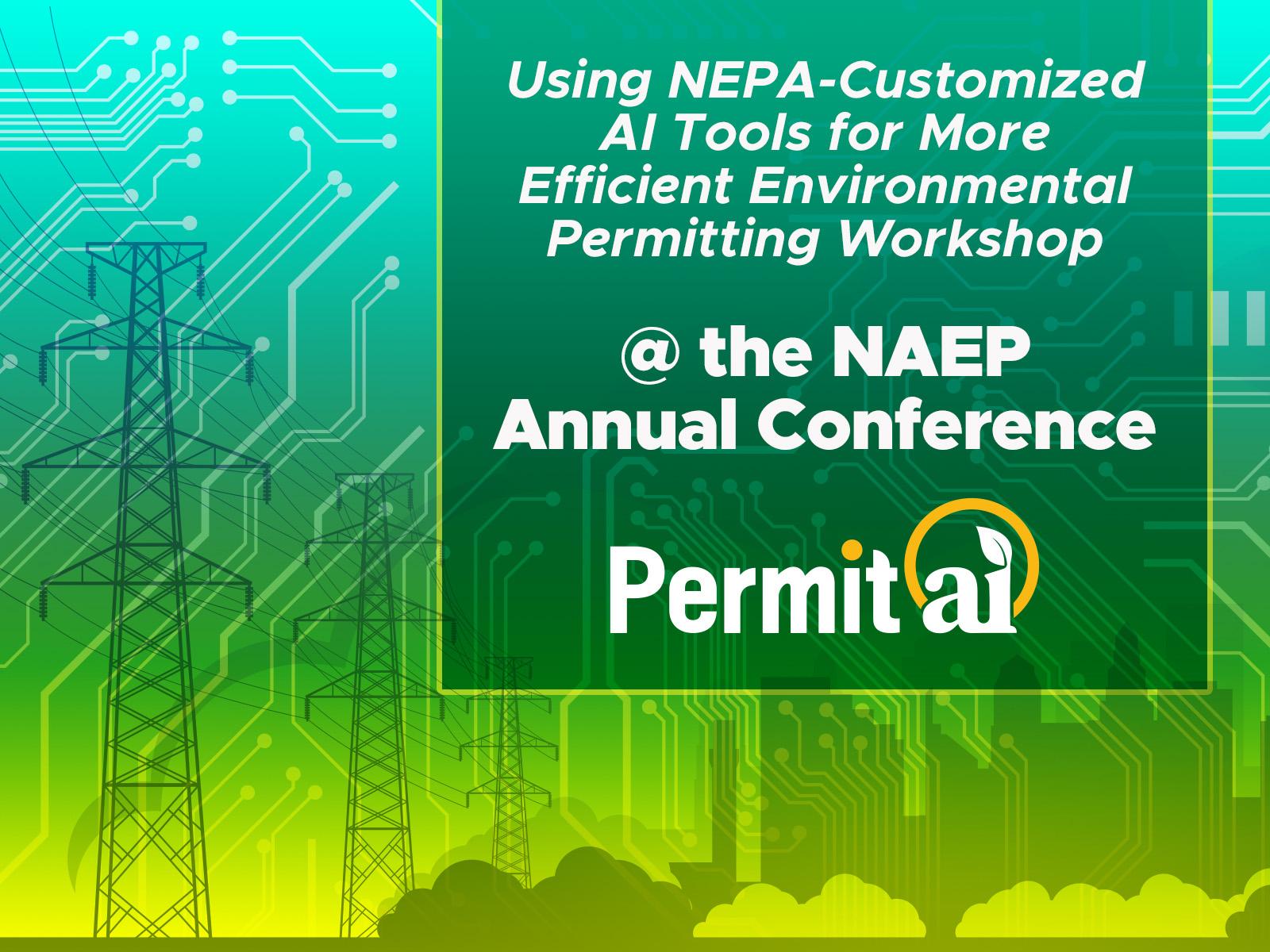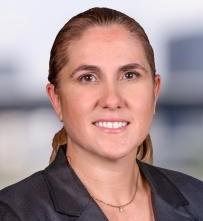Using NEPA-Customized AI Tools for More Efficient Environmental Permitting
Bringing together technical leaders using AI to modernize and streamline federal permitting

Image by Shannon Colson | Pacific Northwest National Laboratory
Charleston Marriott | 170 Lockwood Dr, Charleston, SC 29403
Download the workshop summary report here!
In this three-hour workshop, the PermitAI team from Pacific Northwest National Laboratory (PNNL) will invite participants to explore how recent advances in technology—including large language models, data standardization, and artificial intelligence (AI)-assisted workflows—can help modernize and streamline National Environmental Policy Act (NEPA) processes. Environmental practitioners will leave the workshop understanding the full potential of using AI in the NEPA process and how AI can be integrated seamlessly and responsibly to reduce time on tasks and improve outcomes in environmental permitting. The workshop will be hosted April 29 during the NAEP 2025 Annual Conference & Training Symposium in Charleston, South Carolina.
Keynote
Title: The Future of NEPA is Here: How Technology and Data Standards are Reshaping NEPA (11:00 to 11:30 am ET)
Learn how new technologies, data standards, and advancements are streamlining NEPA and overhauling how environmental practitioners conduct environmental reviews.
About the Speaker

Eric Beightel is a nationally recognized expert on environmental policy, NEPA, and the federal permitting process. He has played a leading role in driving the national effort to streamline the environmental permitting process for major infrastructure projects. At the Permitting Council, Beightel was responsible for overseeing a portfolio of more than $75 billion in large-scale infrastructure projects, supporting federal agencies and project sponsors through expedited federal environmental review and permitting that advanced dozens of critical projects to completion, realizing their economic and environmental benefits for the nation.
Technical Talk
Title: Effective Use of AI in NEPA Workflows (11:35 to 12:15 pm ET)
Learn more about the potential of AI in decision-making workflows, and how NEPA augmented large language models can aid human experts in expediting time-intensive environmental review tasks, such as information retrieval from past historical review documents, public comment processing, and drafting.
About the Speaker

Sameera Horawavalavithana is a senior data scientist at PNNL and a researcher in AI and natural language processing (NLP) across the science, security, and energy domains. He received his PhD in computer science and engineering from the University of South Florida in 2021. He is a pioneering technical lead in developing and deploying AI models to streamline environmental permitting and reviews. He has authored more than 40 peer-reviewed papers, including publications at premier AI conferences and workshops such as NeurIPS, ACL, and EMNLP. He recently serves as the area chair for the Association of Computational Linguistic (ACL), a premier NLP conference, and was recently appointed associate editor in the IEEE Transactions on Artificial Intelligence and an editorial board member in the Nature and Humanities and Social Sciences Communications.
Breakout Sessions
After the technical talks, the workshop will break into three concurrent mini sessions that will each be focused on a specific case study. These breakouts will provide attendees a deeper, more curated dive into practical AI applications in NEPA and give participants a forum for discussion and feedback. Each session will consist of a 25-minute presentation followed by a 30-minute question and answer and feedback session.
Case Study One
Learn how Idaho National Laboratory is using AI to autogenerate a scope of work to streamline NEPA categorical exclusion reviews. (12:20 pm to 1:00 pm ET)
About the Speaker

Matthew Aumeier is an environmental policy and systems innovation expert supporting environmental review and compliance at Idaho National Laboratory, where he leads the development of innovative and adaptive tools that modernize and enhance regulatory processes. His work emphasizes practical, user-focused solutions that improve efficiency, accuracy, and resilience in environmental planning.
About the Moderator

Dan Nally, a project manager at PNNL, leads interdisciplinary teams conducting science-based and objective environmental planning and analysis for government and private clients. Across a wide range of ecosystems and jurisdictions, he specializes in evaluating potential impacts and developing mitigation for complex energy, mineral, and infrastructure projects under NEPA requirements.
Scribe: Anurag Acharya, Data Scientist, PNNL
Case Study Two
Learn how Jacobs Engineering is using AI to derive valuable insights and spot trends in NEPA public comments. Jacobs Engineering will share their workflow and experience interacting with public comments in real projects. . (2:50 to 3:35 pm ET)
About the Speakers

Michelle Rau has over 25 years of experience as an environmental planner and project manager and is a sought after NEPA expert. At Jacobs, she serves as the NEPA practice manager and leads a group of over 200 environmental practitioners. She has managed large-scale and controversial environmental impact statements, including projects with more than a billion dollars of infrastructure investment and engaged activist groups. Michelle has been an active member of NAEP for over 15 years and currently serves on the NAEP Board of Directors as NAEP Secretary. She also leads the NEPA Webinar Committee and has been a trainer during the NAEP advanced NEPA workshops.

Kevin Murphy is environmental data management practice lead at Jacobs Engineering. He brings 27 years of experience in leveraging technology and data to deliver solutions for environmental and infrastructure projects. At Jacobs Engineering he oversees a diverse team of data scientists, application developers, geospatial professionals, and data managers. Since joining Jacobs 17 years ago, Kevin has led digital solutions and is currently driving AI initiatives to enhance project delivery and streamline processes.
About the Moderator

Mike Parker is a PNNL project manager with over 20 years of experience working on environmental impact statements and other NEPA documents. He has an affinity for—and extensive knowledge of—NEPA, applied AI, and communications.
Scribe: Reilly Raab, Post-doctoral Researcher, PNNL
Case Study Three
Learn how Paces AI is enhancing project screening by identifying key metrics and data sources upfront, which in turn streamlines the permitting process for project applicants and facilitates the generation of environmental reports. (3:40 pm to 4:25 pm ET)
About the Speaker

James McWalter is the CEO of Paces AI, a venture backed startup that provides actionable data and analytics for infrastructure developers, operators, and investors to understand what and where to profitably build. He also hosts the Carbotnic Podcast where he interviews invited experts in the energy sector.
About the Moderator

Sarthak Chaturvedi is a Data Scientist at PNNL where he studies numerical optimization and advanced NLP methods to address complex challenges in energy resilience and infrastructure development.
Scribe: Anastasia Bernat, Data Scientist, PNNL
Plenary Session
Moderators from each breakout session will share key takeaways and insights. (4:30 to 4:55 pm ET)
Organizers
Sai Munikoti (Lead)
Data Scientist, PNNL
Dan Nally
Project Manager, PNNL
Lauren Schramm
NEPA Manager, Pond & Company
Keith Benes
Senior Advisor, DOE Office of Policy
Pranava Raparla
Presidential Innovation Fellow, DOE Office of Policy and Office of Critical and Emerging Technologies
Stanley McMillian
Permitting Liaison, DOE Office of Policy
Jack Titus
Policy Advisor, DOE Office of Policy and Office of Critical and Emerging Technologies
Mike Parker
Project Manager, PNNL
Sameera Horawalavithana
Senior Data Scientist, PNNL
Anurag Acharya
Data Scientist, PNNL
Anastasia Bernat
Data Scientist, PNNL